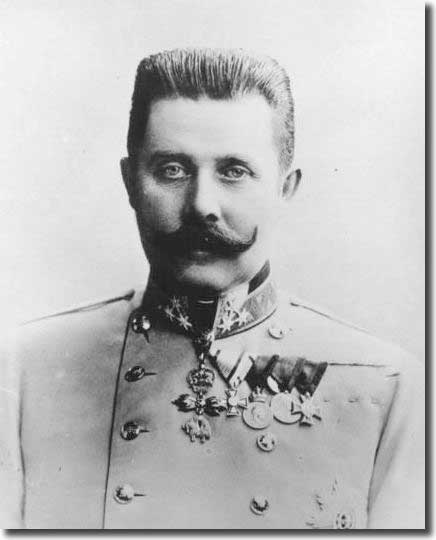 Part 2 Ten years in the making - Part
3 Erratic in the extreme - Results and table
Part 2 Ten years in the making - Part
3 Erratic in the extreme - Results and table
The 1913/14 season ended with Leeds City fourth
in the Second Division, a new high for the club. The narrowness with
which they missed out on promotion hinted that they might well fulfil
that aspiration in the following campaign. Unfortunately, events over
the summer months far away in Central Europe saw to it that the term 'campaign',
along with others appropriated by the football world, such as 'victory'
and 'tactics', would now be used more readily in their original context.
The assassination of heir to the Austro-Hungarian throne, Archduke Franz
Ferdinand, in Sarajevo on 28 June 1914 brought to an angry head a collection
of grumbling disputes that had cast a pall over the continent for years.
The act was the catalyst for a labyrinthine chain of events that would
lead inexorably to the Great War.
Although only third in the line of succession, Ferdinand became heir
apparent following the death of the Emperor's son, Crown Prince Rudolf,
in 1889, and in 1896 that of his own father, Archduke Charles Louis, Emperor
Franz Josef's brother.
Considered arrogant, mistrusting and unrefined by many, Ferdinand was
neither popular nor charismatic. However, the main reason for enmity towards
him was because of suspicion about his intentions after taking power.
He proposed to replace Austro-Hungarian dualism with 'Trialism', a triple
monarchy in which the Slavs would have an equal say alongside the Austrians
and the Hungarians.
Ferdinand was contemplating the idea of even more radical reform: splitting
Austria-Hungary into a number of ethnically and linguistically dominated
semi-autonomous 'states' which would constitute a larger confederation,
to be known as the United States of Greater Austria. Under this plan,
separate languages and cultural identities were encouraged, and the disproportionate
balance of power would be righted. The proposals were fundamentally opposed
by the Hungarian element of the Dual Monarchy, as they would have brought
a significant territorial loss for the Magyars.
The approach was designed to stay the disintegration of the fading Austro-Hungarian
Empire, but Ferdinand's plans set him at odds with the ruling elite.
As Inspector General of the army, Ferdinand accepted an invitation from
General Oskar Potiorek to visit Sarajevo, the capital of Bosnia, to inspect
army manoeuvres. Bosnia and Herzegovina were provinces that had been under
Austro-Hungarian administration since 1878. Austria annexed the provinces
outright in 1908, a controversial move which caused unrest and suspicion
amongst other European governments. There was even greater antipathy from
supporters of the idea of a Greater Serbia, who were positively outraged.
Their avowed aim was to absorb the provinces into a Serbian led pan-Slav
state.
Bosnia was consequently a perilous destination and it proved fatal for
Franz Ferdinand. He was murdered on 28 June in Sarajevo by Gavrilo Princip,
a representative of the Black Hand, a Serbian nationalist secret society,
in an attempt to stall his proposed reforms.
Austria was quick to capitalise on the incident, claiming the Serbian
government was the mens rea behind the act. She seized on the opportunity
to rattle her sabres, in a concerted attempt to crush the nationalist
movement in the Balkan states and cement her influence in the region.
Elements within the Austro-Hungarian government had been eagerly seeking
a pretext for offensive action for years, and this was their golden opportunity.
Nationalist pan-Slav agitation within Serbia, which Austria suspected
was encouraged by the Serbian government, could only undermine the Empire's
influence in the Balkans.
The assassination was seen, at least in Austro-Hungarian eyes, as legitimising
what it confidently expected would be a limited war against the manifestly
weaker Serbians.
back to top
Serbia had strong historic links with Russia, the two sharing a common
heritage that had evolved over several centuries. In 1878 Serbia was indebted
to Russian diplomatic support for her success in gaining independence.
The historic alliance was cause for some trepidation on the part of the
Austro-Hungarians.
To assuage their anxieties, Austria sought assurances from her own ally,
Germany, that she would provide support should Russia enter the dispute.
The Germans were delighted to offer their aid: a conflict outside the
national borders ideally suited their own purposes and they offered an
unconditional guarantee of support on 5 July.
Left wing parties in Germany, particularly the Social Democratic Party,
made heavy gains in the national elections of 1912. The German Government
was still dominated by the Prussian Junkers, who feared the rise of the
Left. The German historian, Fritz Fischer, argued that they deliberately
sought an external war as a distraction, which would stoke up patriotic
support for the Government.
Such dark political intrigue relied on a calculated gamble regarding
the responses of other governments. With an element of undoubted complacency,
provocative action was considered a risk well worth taking.
Germany offered what became known as "the blank cheque" to Austria on
6 July. The German Kaiser, Wilhelm II, promised unconditional support
for Austria regardless of whatever sanction she intended to impose upon
Serbia.
It was clear that Germany was prepared for a limited conflict with France
and Russia; she hoped to avoid war with Britain, gambling 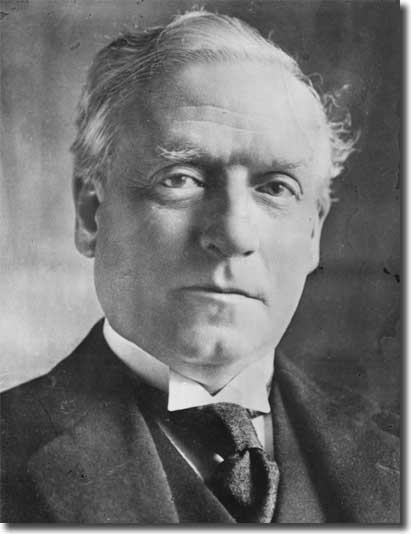 that
the British would shy away from war in an attempt to retain neutrality.
that
the British would shy away from war in an attempt to retain neutrality.
On 23 July, Austria presented Serbia with an ultimatum demanding that
the assassins be brought to justice. A reply was demanded within 48 hours,
in the full expectation that the terms would be rejected, thereby providing
the pretext for war. British Foreign Secretary Sir Edward Gray commented
that he had 'never before seen one state address to another independent
state a document of so formidable a character', though the government
sought to mediate throughout July, attempting desperately to remain neutral.
The Serbian Prime Minister, Nikola Pasic, appealed to Russia for help.
On 25 July, while waiting for assurance of support, Pasic agreed to all
Austro-Hungarian demands bar one: he was unable to hand over the three
men who had engineered the assassination as it 'would be a violation of
Serbia's Constitution and criminal in law'. The Austrians were caught
off guard by the compliance of the response, so disconcerted that they
concealed the communication for two days from the Germans. The Kaiser
commented that the reply was 'a great moral victory for Vienna, but with
it every reason for war disappears'.
Nevertheless claiming they were not satisfied with Serbia's response
to their ultimatum, Austria declared war on 28 July. Russia immediately
announced mobilisation of her army in defence of Serbia. On 31 July the
Germans demanded that Russia halt her mobilisation within 12 hours; they
also demanded that France should remain neutral and hand over border fortresses
as a guarantee. The Germans knew these were unacceptable terms and the
inevitable rejection allowed them to declare war on Russia on 1 August.
Two days later, Germany declared war on France and invaded Belgium so
as to reach Paris by the shortest possible route.
A Triple Entente between Russia, France and Britain had long been in
place; in addition Britain had a commitment, dating back to 1839, to defend
Belgian neutrality. The British government, led by Prime Minister Hebert
Asquith, felt that they had to draw a line in the sand and gave Germany
an ultimatum to get out of Belgium by midnight, 3 August.
It is thought that Germany would have backed away from war had Britain
given a prompter hint of her resolve. Believing that the British would
stay out of the coming conflict and limit themselves to diplomatic protests,
Germany proceeded under the belief that war would be fought solely with
France and Russia.
The British government, in the person of Foreign Secretary, Sir Edward
Gray, attempted to mediate throughout July, reserving at all times its
right to remain aloof from the dispute. It was only as the War began that
the British position solidified into support for Belgium.
Asquith had a simple choice: he could turn a blind eye to a war in mainland
Europe that might have little impact on Britain if she stood as a neutral,
or he could mark himself with the British public as a man of principle
who held firm against the perceived bullying of Germany. Future Prime
Minister Winston Churchill described the scene in London in the hours
that led to the declaration of war.
'It was eleven o'clock at night - twelve by German time - when the ultimatum
expired. The windows of the Admiralty were thrown wide open in the warm
night air. Under the roof from which Nelson had received his orders were
gathered a small group of admirals and captains and a cluster of clerks,
pencils in hand, waiting. Along the Mall from the direction of the Palace
the sound of an immense concourse singing 'God save the King' floated
in. On this deep wave there broke the chimes of Big Ben; and, as the first
stroke of the hour boomed out, a rustle of movement swept across the room.
The war telegram, which meant, 'Commence hostilities against Germany,'
was flashed to the ships and establishments under the White Ensign all
over the world. I walked across the Horse Guards Parade to the Cabinet
room and reported to the Prime Minister and the Ministers who were assembled
there that the deed was done.'
back to top
Asquith addressed a packed House of Commons, saying, 'We have made a
request to the German Government that we shall have a 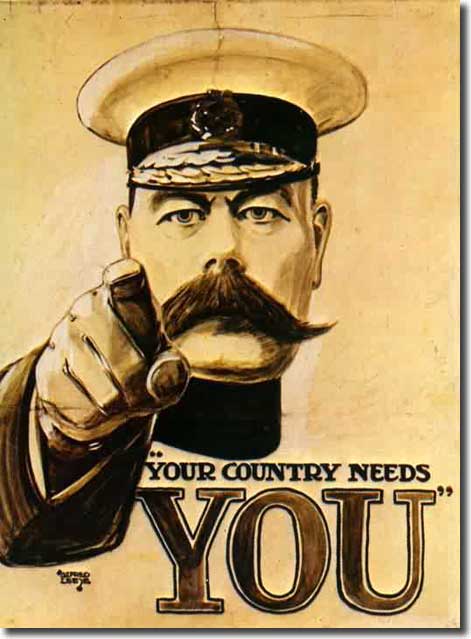 satisfactory
assurance as to the Belgium neutrality before midnight tonight. The German
reply to our request was unsatisfactory.'
satisfactory
assurance as to the Belgium neutrality before midnight tonight. The German
reply to our request was unsatisfactory.'
Asquith explained that he had received a telegram from the German Ambassador
in London who, in turn, had received one from the German Foreign Secretary.
Officials in Berlin wanted the point pressed home that German forces went
through Belgium to avoid the French doing so in an attack on Germany.
Berlin had "absolutely unimpeachable information"'that the French planned
to attack the German Army via Belgium. Asquith stated that the Government
could not "regard this in any sense a satisfactory communication… We have,
in reply to it, repeated the request we made last week to the German Government
that they should give us the same assurance with regard to Belgium neutrality
as was given to us and to Belgium by France last week. We have asked that
a reply to that request and a satisfactory answer to the telegram of this
morning should be given before midnight.'
Nothing of the sort was received and the Foreign Office released this
statement:
'Owing to the summary rejection by the German Government of the request
made by His Majesty's Government for assurances that the neutrality of
Belgium would be respected, His Majesty's Ambassador in Berlin has received
his passport, and His Majesty's Government has declared to the German
Government that a state of war exists between Great Britain and Germany
as from 11pm on August 4th.'
Britain's declaration of war against Germany brought the support of British
Commonwealth countries like Australia, Canada, India and New Zealand,
alongside Japan, who had a military agreement with Britain.
Thus, what had commenced as a little local difficulty escalated rapidly
into global conflict. The expansionist leanings of Otto von Bismarck,
first Prime Minister of Prussia and then Chancellor of the German Empire,
and Kaiser Wilhelm II had rendered such an outcome inevitable.
On the outbreak of war, Britain had just under 250,000 regular troops.
It was clear that many thousands more would be needed to defeat the Germans
and on 7 August, Lord Kitchener, the War Minister, launched a recruitment
campaign, calling for men aged between 19 and 30 to sign up. This was
very successful, with an average of 33,000 men joining every day. Three
weeks later the upper limit for recruiting was raised to 35 and by the
middle of September over 500,000 men had volunteered. At the beginning
of the War the army had strict regulations about who could become soldiers.
Men joining the army had to be at least 5ft 6in tall with a chest measurement
of 35 inches. However, these specifications were loosened up in order
to get more men to join the armed forces.
British forces were sent to help stop the German advance across France,
and few thought that they would not return before Christmas. But by 1915
the opposing sides had dug themselves into a system of trenches that zigzagged
along the Western Front, a battlefield extending some 450 miles across
Belgium and North-Eastern France to the border of Switzerland. They remained
deadlocked in this trench warfare until 1918.
Stephen Studd in Herbert Chapman: Football Emperor: 'Britain was
the only country entering the War without compulsory military service.
As the football season approached, the question arose whether the League
competition should be suspended so that players and officials could be
free to volunteer for the war effort. It was a situation organised football
had never had to face before, and there was no precedent on which to base
a decision. Flying in the face of public opinion and patriotic fervour,
the authorities decided to go ahead with games as planned.
'The reaction was one of violent denunciation. Newspapers said they would
not report matches and carried a barrage of irate letters. A Yorkshire
Post reader suggested that the King should resign as patron of the
Football Association. At the same time the FA "urged players and
spectators who are physically fit and otherwise able to join the Army",
and several players did so, but the Football League insisted that "in
the interests of the people of this country, football ought to be continued."
back to top
'The League's attitude reflected the traditional belief that the ordinary
citizen need not be affected by war. Wars had been fought before by the
regular Army, and this one, it was supposed, would be the same: it would
be over in a few months, if not weeks. So League teams kicked off in the
usual way, while the guns blazed across the Channel. After a few weeks
newspapers lifted their ban on match reports, and, while the War was waged
on the front page, the struggle for league points gathered pace on the
back.'
The announcement by the football authorities that the football programme
was to continue provoked a fierce backlash. Criticism was vociferous and
clubs were accused of selfishness and conspiring with the enemy; the Dean
of Lincoln wrote to the FA of 'onlookers who, while so many of their fellow
men are giving themselves in their country's peril, still go gazing 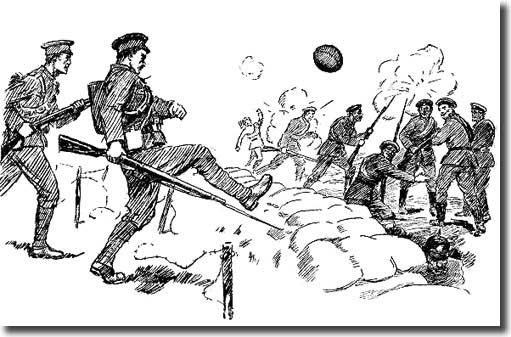 at
football'.
at
football'.
Many senior players quit their clubs to volunteer for the armed forces,
but the League decided to carry on with their programme. The football
authorities contributed to war charities, and assisted in the recruitment
of volunteers.
As most League players were professionals and thus tied contractually
to their clubs, they could only join the forces if the clubs agreed to
cancel their contracts. If they refused, the men could be sued by their
clubs for breach of contract. Some newspapers suggested that those who
did not join up were 'contributing to a German victory', piling moral
pressure on players.
Under considerable pressure, the Football Association eventually backed
down and called for football clubs to release all unmarried professional
footballers to join the armed forces. The FA also agreed to work closely
with the War Office to encourage football clubs to organise recruiting
drives at matches.
At Elland Road, Leeds City's management invited Lord Mayor Edward Brotherton
and local MPs to address spectators at the end of the season's opening
game in the hope of getting them to sign up. The club's official Receiver,
Tom Coombs, came up with the idea and
got support from Captain Kelly, the local head of army recruitment. Coombs
undertook to provide the necessary support staff and resources to administer
the exercise.
The Athletic News responded angrily to the general criticism of
football: 'The whole agitation is nothing less than an attempt by the
ruling classes to stop the recreation on one day in the week of the masses...
What do they care for the poor man's sport? The poor are giving their
lives for this country in thousands. In many cases they have nothing else...
These should, according to a small clique of virulent snobs, be deprived
of the one distraction that they have had for over thirty years.'
On 31 August, the Consultative Committee of the Football Association
issued the following statement: 'The Football Association earnestly appeals
to the patriotism of all who are interested in the game to help in all
possible ways in support of the nation in the present serious crisis,
and particularly to those able to render personal service in the Army
and Navy which are so gallantly upholding our national honour.
'To those unable to render personal service the Association would appeal
for their generous support of funds for the relief and assistance of dependents
of those who are engaged in serving their country.
'The Football Association will contribute £1,000 to the Prince of Wales'
War Fund and £250 to the Belgian Relief Fund.
'It was stated that of about a million players only 7,000 were professionals
and of those only 2,500 were exclusively engaged for football. The opinion
of the War Office was in favour of continuing football. It was resolved
that clubs should give every facility for the temporary release of players
who desired to join the colours.'
President John McKenna reported on the views of the League Management
Committee: 'Any national sport which can minimise the grief, help the
nation to bear the sorrows, relieve the oppression of continuous strain,
and save the people at home from 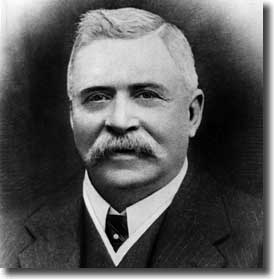 panic
and undue depression is a great national asset which can render lasting
service to the people.
panic
and undue depression is a great national asset which can render lasting
service to the people.
Just as we look hour after hour for the latest news from the theatres
of war, our vast armies in the field will week by week look for papers
from home, and insofar as their mind may be temporarily distracted from
the horrors of war and the intense strain of days and weeks of almost
unrestricted fighting, much will be done to give them fresh heart, fresh
hopes and a renewed vitality for the work before them.
'At home our clubs were in a helpless position, as their contracts, entered
into with all the formality of legal contracts, must be performed as far
as possible. We feel that the advice offered by politicians, the Press,
and commercial authorities that business should be carried on as usual
is sound, well considered and well reasoned advice. We therefore, without
the slightest reservation, appeal to the clubs, the Press and the public
that our great winter game should pursue its usual course.
back to top
'Every club should do all in its power to assist the war funds. Every
player should specially train to be of national service at least in national
defence. Whilst we unreservedly authorise the due fulfilment of the League
programme, we must all accept to the full every obligation that we can
individually and collectively discharge for our beloved country and our
comrades in arms who in this fight for righteousness and justice, at the
risk of their lives, have answered to duty's call.'
In the first week of September, FA secretary Fred Wall (later Sir Frederick)
wrote to the War Office stating that the FA was prepared to request all
their members to stop the playing of matches if the War Office was of
the opinion that such a course would assist them in their duties.
The War Office expressed gratitude to the FA for their assistance in
obtaining recruits for the army and in placing football grounds at their
disposal, but went on, 'The question whether the playing of matches should
be entirely stopped is more a matter for the discretion of the Association,
but the Council realise the difficulties involved in taking such an extreme
step, and they would deprecate anything being done which does not appear
to be called for by the present situation.
'Should your Association decide to continue the playing of matches, the
Council trust that arrangements will be made so as not to interfere with
the facilities at present afforded to the recruiting authorities. The
Council also suggest that the Association might take all steps in their
power to press the need of the country for recruits upon spectators who
are eligible for enlistment, and they would further venture to suggest
that some portion of the gate money might be set aside for the charitable
relief of the families and dependents of all soldiers and sailors who
are serving in the present war.'
The public of Leeds played their full part in the war effort. The leeds-pals.com
website carries the tale of the Leeds Pals, 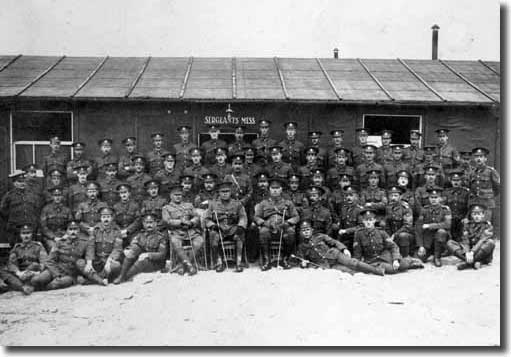 The
15th (service) Battalion (1st Leeds) The Prince of Wales' Own (West Yorkshire
Regiment).
The
15th (service) Battalion (1st Leeds) The Prince of Wales' Own (West Yorkshire
Regiment).
'The general idea of a Pals' Battalion was that the volunteers would
join and serve with friends, relatives, workmates and colleagues, giving
a feeling of comradeship that had never been seen before.
'Most major towns and cities … raised Pals' Battalions. To be accepted
to these elite units, the recruits were to pass certain requirements.
Education and intelligence were considered paramount to being accepted
in the majority of cases. It was not only businessmen and local dignitaries
however, that were recruited; Great Britain supplied its finest and for
Leeds this meant several famous sports men also. Evelyn
Lintott (later to be commissioned), a Leeds City and international
half-back footballer, along with Morris Flemming, another footballer,
were considered a bonus to the Battalion. Yorkshire cricketers featured
among the recruits who included Major Booth, Arthur Dolphin and Roy Kilner.
Team sports did not offer the only possibilities but also athletes such
as Albert Gutteridge and George Colcroft were eager to be a part of something
so patriotic and unique that it may never be seen again.
'By the 8th of September 1914 the Battalion had enlisted some 1,275 men
after rejecting many on medical grounds. This number at the time was considered
to be complete although the final number of Leeds Pals eventually rose
to approximately 2,000.
'France was expected to be the Pals' first destination but this was not
so. Early December 1915 saw the first group of Pals set sail for Suez.
Inevitably France was to be for many of the Pals their final destination.
'On March 1st 1916 the Pals set sail for Marseilles as the Battle of
the Somme became imminent. The battle was to prove tragic for the Leeds
Pals. Twenty-four Pals' officers went over the top with their men on that
fateful day, 1st July 1916. Lieutenant Major Booth, the famous cricketer,
and Evelyn Lintott, the footballer, were just two of the many that were
killed in action. Approximately 750 out of 900 involved in the Somme died.
'The patriotism shown by the people of Leeds at the outbreak of war with
Germany was reflected in the City Council's approach to, and involvement
in, the raising of the 1st Leeds Battalion. Quite a few family members
of the raising committee were already serving or would later serve as
officers with the Pals. Its first Colonel was Walter Stead, a prominent
local solicitor and Council member, who had made the original application
to Lord Kitchener for permission to raise the Leeds Battalion. This had
been seconded in a telegram sent to Kitchener by Edward Brotherton, the
Lord Mayor of Leeds, who personally bore the cost of raising and outfitting
the Battalion. He also placed his personal fortune in the hands of the
Council as a guarantee against the costs Leeds might incur in the War.
'Alderman Charles Wilson JP became the Quartermaster. Alderman and Solicitor
Arthur Willey's son Tom and James Wardle's son James were commissioned
into the Pals as Lieutenants, along with Maurice Bickersteth, son of the
Vicar of Leeds. The zeal and patriotism of the Council was then applied
to finding a site large enough to accommodate upwards of 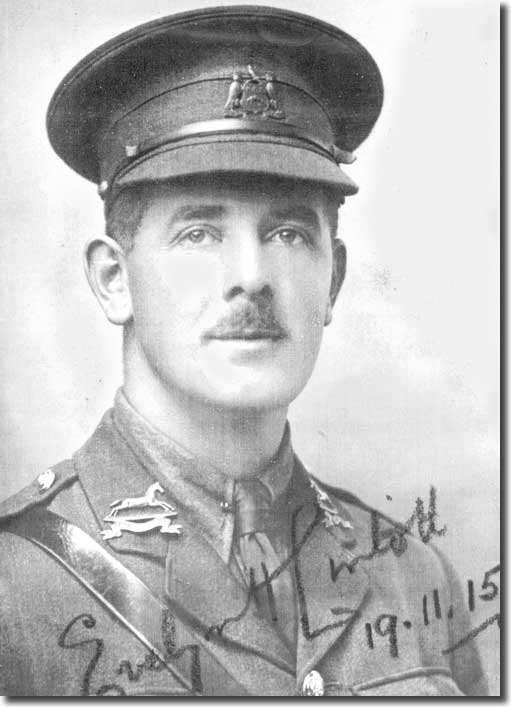 a
thousand men, at a pace unheard of today, land at Breary Banks in Colsterdale
owned by the waterworks department and being used for the building of
a new reservoir was placed … at the battalion's disposal.
a
thousand men, at a pace unheard of today, land at Breary Banks in Colsterdale
owned by the waterworks department and being used for the building of
a new reservoir was placed … at the battalion's disposal.
back to top
'The time spent at Colsterdale was for most, the best time of their lives.
Carefree days with good food, good accommodation and good company, their
civilian skills were soon being put to military use. When material started
arriving for the construction of more solid accommodation, recruits with
the necessary backgrounds were employed on hut building, men with country
backgrounds were soon catching the rabbits that were so abundant around
Colsterdale, enabling the battalion cooks to serve up regular meals of
rabbit stew, so regular that one Pal, Walter Astle, on returning home
after the War, refused to eat rabbit for the rest of his life.'
The country's professional footballers were pilloried for what was regarded
as their unpatriotic reluctance to enlist for the war effort. Spartacus.schoolnet.co.uk:
'On 6 September 1914, Arthur Conan Doyle (the creator of Sherlock Holmes
and himself a goalkeeper with the amateur side, Portsmouth AFC), appealed
for footballers to join the armed forces: "There was a time for all
things in the world. There was a time for games, there was a time for
business, and there was a time for domestic life. There was a time for
everything, but there is only time for one thing now, and that thing is
war. If the cricketer had a straight eye, let him look along the barrel
of a rifle. If a footballer had strength of limb, let them serve and march
in the field of battle."
'Frederick Charrington, the son of the wealthy brewer who had established
the Tower Hamlets Mission, attacked the West Ham United players for being
effeminate and cowardly for getting paid for playing football while others
were fighting on the Western Front. The famous amateur footballer and
cricketer, Charles B Fry, called for the abolition of football, demanding
that all professional contracts be annulled and that no one below forty
years of age be allowed to attend matches.
'William Joynson Hicks established the 17th Service (Football) Battalion
of the Middlesex Regiment on 12th December, 1914. This group became known
as the Football Battalion. According to Frederick Wall, the secretary
of the Football Association, the England international centre-half, Frank
Buckley, was the first person to join the Football Battalion. At first,
because of the problems with contracts, only amateur players like Vivian
Woodward and Evelyn Lintott were able to sign up.
'As Frank Buckley had previous experience in the British Army he was
given the rank of Lieutenant. He eventually was promoted to the rank of
Major. Within a few weeks the 17th Battalion had its full complement of
600 men. However, few of these men were footballers. Most of the recruits
were local men who wanted to be in the same battalion as their football
heroes. For example, a large number who joined were supporters of Chelsea
and Queens Park Rangers who wanted to serve with Vivian Woodward and Evelyn
Lintott.
'At the beginning of the 1914/15 football season, Hearts was Scotland's
most successful team, winning eight games in succession. On 26th November
1914, every member of the team joined the British Army. This event had
a major impact on the public and inspired footballers and their fans to
enlist. Seven members of the Hearts team never returned to Scotland. Three
of the men, Harry Wattie, Duncan Currie and Ernie Ellis, were killed on
the first day of the Somme offensive. Another member of the team, 22-year-old
Paddy Crossan, was so badly injured that his right leg was labelled for
amputation. He pleaded with the German surgeon not to operate. He told
him: "I need my legs - I'm a footballer." He agreed to his request
and managed to save his leg. Crossan survived the War but later died as
a result of his lungs being destroyed by poison gas.
'By March 1915, it was reported that 122 professional footballers had
joined the battalion. This included the whole of the Clapton Orient first
team. Three of them were later killed on the Western Front. At the end
of the year Walter Tull, who had played for Tottenham Hotspur, Northampton
Town and Glasgow Rangers, joined the battalion. Major Frank Buckley soon
recognised Tull's leadership qualities and he was quickly promoted to
the rank of Sergeant.
'On 15th January 1916, the Football Battalion reached the front line.
During a two-week period in the trenches, four members of the battalion
were killed and 33 were wounded. This included Vivian Woodward who was
hit in the leg with a hand grenade. The injury to his right thigh was
so serious that he was sent back to England to recover.
back to top
'Woodward did not return to the Western Front until August 1916. The
Football Battalion had taken heavy casualties during the Somme offensive
in July. This included the death of England international footballer,
Evelyn Lintott. The battle was still going on when Woodward arrived but
the fighting was less intense. However, on 18th September a German attack
involving poison gas 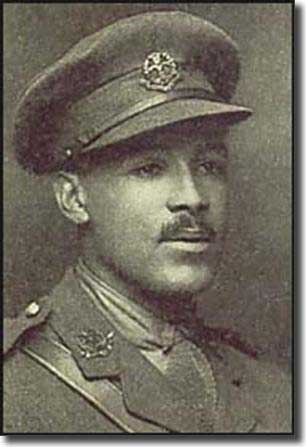 killed
14 members of the battalion.
killed
14 members of the battalion.
'Major Frank Buckley was also seriously injured during this offensive
when metal shrapnel had hit him in the chest and had punctured his lungs.
George Pyke, who played for Newcastle United, later wrote: "A stretcher
party was passing the trench at the time. They asked if we had a passenger
to go back. They took Major Buckley but he seemed so badly hit, you would
not think he would last out as far as the Casualty Clearing Station."
Buckley was sent to a military hospital in Kent and after operating on
him, surgeons were able to remove the shrapnel from his body. However,
his lungs were badly damaged and he was never able to play football again.
'William Angus played for Glasgow Celtic before joining the 8th Battalion,
Highland Light Infantry. On 11th June, Lieutenant James Martin led a covert
bombing raid on an embankment in front of the German trenches. The party
was spotted and the enemy detonated a large mine hidden in the earth.
Martin was one of the causalities of the explosion. At first, he was thought
to be dead, but he was seen to move as he pleaded for water from the Germans.
The soldiers responded by throwing a grenade over the parapet.
'As soon as he heard what had happened, William Angus volunteered to
attempt a rescue of the man who also came from Carluke. At first this
was vetoed by senior officers who considered it a suicidal mission. Angus
replied that it did not matter much whether death came now or later. Eventually,
Brigadier General Lawford gave permission for Angus to try and save Martin.
'A rope was tied around William Angus so that he could be dragged back
if killed or seriously wounded. Angus managed to reach Martin by crawling
through No Man's Land without being detected. He gave him a drink of brandy
before attaching the rope to Martin. Angus then tried to carry Martin
back to the safety of the British trench 70 yards away. However, once
upright, Angus was soon seen by the Germans and he came under heavy fire.
Angus was hit and he fell to the ground. For the next few minutes he sheltered
Martin with his own body. Angus then signalled to the British troops to
pull Martin to safety. He then set off at right angles to the trench,
drawing the enemy fire away from Martin. Despite being hit several times,
he managed to drag himself back to the trenches. His injuries resulted
in him losing his left eye and part of his right foot.
'His commanding officer, Lieutenant Colonel Gemmill later wrote that
"no braver deed was ever done in the history of the British Army."
For this act of bravery William Angus became the first professional footballer
to be awarded the Victoria Cross. Angus' citation read: "For most
conspicuous gallantry and devotion to duty at Givenchy, on 12th June 1915,
in voluntarily leaving his trench under very heavy fire and rescuing an
officer who was lying within a few yards of the enemy position. Lance
Corporal Angus had no chance of escaping the enemy's fire when undertaking
this very gallant action, and in effecting the rescue he sustained about
forty wounds from bombs, some of them being very serious."
'It has been argued that Donald Bell, a defender with Bradford City,
was the first professional footballer to join the British Army after the
outbreak of the War. He enlisted as a Private but by June, 1915 he had
a commission in the Yorkshire Regiment. Two days after his marriage in
November 1915, he was sent to France.
'Second Lieutenant Bell took part in the Somme offensive. On 5th July
he stuffed his pockets with grenades and attacked an enemy machine gun
post. When he attempted to repeat this feat five days later he was killed.
He was awarded a posthumous Victoria Cross for his action.'
Such acts of bravery and selflessness are legion in the history of the
Great War and it seems more fitting to remember them than the accusations
of cowardice and self-preservation which were laid at the doors of those
who were considered, even then, pampered and overpaid dilettantes.
Part 2 Ten years in the making - Part
3 Erratic in the extreme - Results and table
back to top












 Part 2 Ten years in the making - Part
3 Erratic in the extreme - Results and table
Part 2 Ten years in the making - Part
3 Erratic in the extreme - Results and table that
the British would shy away from war in an attempt to retain neutrality.
that
the British would shy away from war in an attempt to retain neutrality. satisfactory
assurance as to the Belgium neutrality before midnight tonight. The German
reply to our request was unsatisfactory.'
satisfactory
assurance as to the Belgium neutrality before midnight tonight. The German
reply to our request was unsatisfactory.' at
football'.
at
football'. panic
and undue depression is a great national asset which can render lasting
service to the people.
panic
and undue depression is a great national asset which can render lasting
service to the people. The
15th (service) Battalion (1st Leeds) The Prince of Wales' Own (West Yorkshire
Regiment).
The
15th (service) Battalion (1st Leeds) The Prince of Wales' Own (West Yorkshire
Regiment). a
thousand men, at a pace unheard of today, land at Breary Banks in Colsterdale
owned by the waterworks department and being used for the building of
a new reservoir was placed … at the battalion's disposal.
a
thousand men, at a pace unheard of today, land at Breary Banks in Colsterdale
owned by the waterworks department and being used for the building of
a new reservoir was placed … at the battalion's disposal. killed
14 members of the battalion.
killed
14 members of the battalion.